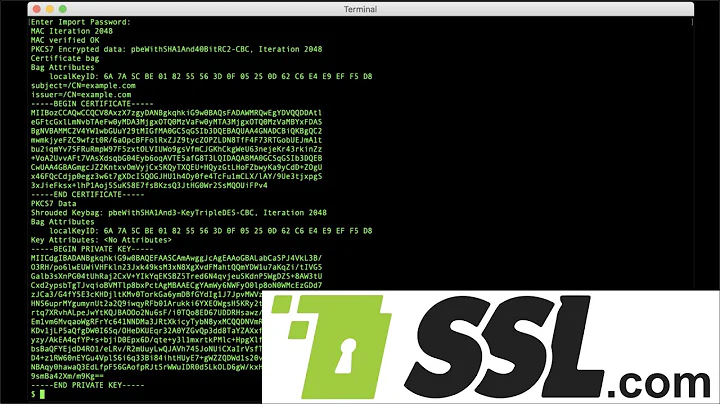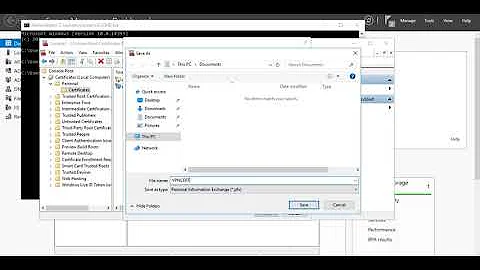Adding certificate chain to p12(pfx) certificate
Own answer.
I figured out how to do this with OpenSSL:
openssl pkcs12 -in certificate.p12 -out clientcert.pem -nodes -clcerts
openssl x509 -in trusted_ca.cer -inform DER -out trusted_ca.pem
openssl x509 -in root_ca.cer -inform DER -out root_ca.pem
cat clientcert.pem trusted_ca.pem root_ca.pem >> clientcertchain.pem
openssl pkcs12 -export -in clientcertchain.pem -out clientcertchain.pfx
Related videos on Youtube
bary
Updated on July 09, 2022Comments
-
bary almost 2 years
I have aplication in java and cxf which connects to WebServices with client certificate.
I got certificates form WebService owner
- certificate.p12
- certificate.pem
- certificate.crt
- trusted_ca.cer
- root_ca.cer
I have problem with straightforward converting this p12 certficate to working jks keystore requred by java.
I did this:
keytool -importkeystore -srckeystore certificate.p12 -srcstoretype PKCS12 -destkeystore certificate1.jks -deststoretype JKS -storepass secret keytool -import -alias root -file root_ca.cer -trustcacerts -keystore certificate1.jks -storepass secret keytool -import -alias trusted -file trusted_ca.cer -trustcacerts -keystore certificate1.jks -storepass secretbut this jks doesn`t work and I get HTTP response '403: Forbidden' when using this certificate1.jks
However if I import this p12(pfx) certificate to Internet Explorer and then export this certificate from IE to pfx format selecting "Include all certificates in the certification path" checkbox and use:
keytool -importkeystore -srckeystore certificate.pfx -srcstoretype PKCS12 -destkeystore certificate2.jks -deststoretype JKS -storepass secret keytool -import -alias root -file root_ca_kir.cer -trustcacerts -keystore certificate2.jks -storepass secret keytool -import -alias trusted -file trusted_ca_kir.cer -trustcacerts -keystore certificate2.jks -storepass secretThen everything works fine and I can connect to WebService using certificate2.jks.
I found that original certificate.p12(pfx) contains only one entry (Certificate chain length: 1):
keytool -list -keystore certificate.p12 -storepass secret -storetype PKCS12 -v ******************************************* ******************************************* Alias name: alias Entry type: PrivateKeyEntry Certificate chain length: 1 Certificate[1]: Owner: CN=MyCompany, [email protected], O=bla, C=PL Issuer: CN=Trusted CA, O=ble, C=PL Serial number: xxxxxxxxxxxxxxxxxxxxxxxxxxxxxxxxxxxxxxxx Valid from: ... until: ... Certificate fingerprints: MD5: XX:XX:XX:XX:XX:XX:XX:XX:XX:XX:XX:XX:XX:XX:XX:XX SHA1: XX:XX:XX:XX:XX:XX:XX:XX:XX:XX:XX:XX:XX:XX:XX:XX:XX:XX:XX:XX Signature algorithm name: SHA1withRSA Version: 3 Extensions: #1: ObjectId: X.X.XX.XX Criticality=false KeyUsage [ DigitalSignature Key_Encipherment ] ... ******************************************* *******************************************while certificate.pfx exported from IE with "Include all certificates in the certification path" contains certificate chain with second Trusted CA certificate (Certificate chain length: 2):
keytool -list -keystore certificate.p12 -storepass secret -storetype PKCS12 -v ******************************************* ******************************************* Alias name: alias Entry type: PrivateKeyEntry Certificate chain length: 2 Certificate[1]: Owner: CN=MyCompany, [email protected], O=bla, C=PL Issuer: CN=Trusted CA, O=ble, C=PL Serial number: xxxxxxxxxxxxxxxxxxxxxxxxxxxxxxxxxxxxxxxx Valid from: ... until: ... Certificate fingerprints: MD5: XX:XX:XX:XX:XX:XX:XX:XX:XX:XX:XX:XX:XX:XX:XX:XX SHA1: XX:XX:XX:XX:XX:XX:XX:XX:XX:XX:XX:XX:XX:XX:XX:XX:XX:XX:XX:XX Signature algorithm name: SHA1withRSA Version: 3 Extensions: #1: ObjectId: X.X.XX.XX Criticality=false KeyUsage [ DigitalSignature Key_Encipherment ] ... Certificate[2]: Owner: CN=Trusted CA, O=ble ble ble, C=PL Issuer: CN=ROOT CA, O=ble ble ble, C=PL Serial number: xxxxxxxxxxxxxxxxxxxxxxxxxxxxxxxxxxxxxxxx Valid from: ... until: ... Certificate fingerprints: MD5: XX:XX:XX:XX:XX:XX:XX:XX:XX:XX:XX:XX:XX:XX:XX:XX SHA1: XX:XX:XX:XX:XX:XX:XX:XX:XX:XX:XX:XX:XX:XX:XX:XX:XX:XX:XX:XX Signature algorithm name: SHA1withRSA Version: 3 Extensions: ******************************************* *******************************************So to solve my problem I need to have p12 certificate with chain to trusted CA certificate. I can do this by importing p12 to IE and then exporting back with "Include all certificates in the certification path".
How can I do this without IE using keytool or other tool?
Bary
-
ixe013 almost 9 yearsAdd to add the
-nokeysoption to the last command. I have OpenSSL 1.0.1e-fips 11 Feb 2013 -
 bgStack15 over 8 yearsI spent hours looking for this functionality. Fantastic! I needed it for Tomcat 7.0.63 on Windows 2008 R2.
bgStack15 over 8 yearsI spent hours looking for this functionality. Fantastic! I needed it for Tomcat 7.0.63 on Windows 2008 R2. -
Cocowalla almost 6 years@ixe013 you would only use the
-nokeysoption if you didn't want the private key to be stored in the resulting pfx file





